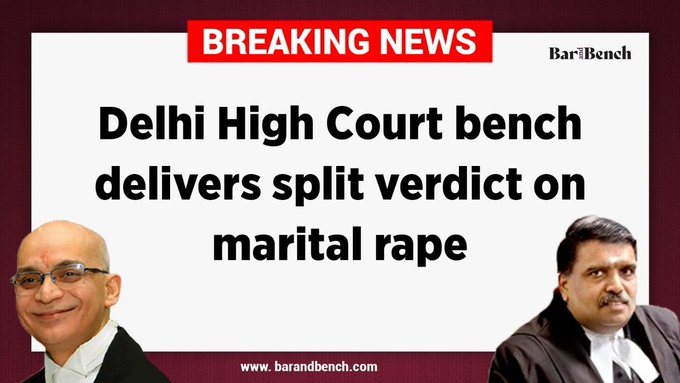Source: The Hindu: Dated: 11th May 2022
NGO Men Welfare Trust (MWT), which is opposing the batch of petitions seeking criminalisation of marital rape, had argued that sexual intercourse between a husband and wife cannot be treated at a par with that in non-marital relationships as the issue of consent cannot be divorced from the context of a marriage.
Court permits parties involved in case to approach Supreme Court.

The Delhi High Court on May 11 delivered a split verdict on the issue of criminalising marital rape.
Justice Rajiv Shakdher struck down Exception 2 of Section 375 Indian Penal Code (IPC), which decriminalises marital rape.
On the other hand, Justice C. Hari Shankar upheld the validity of the controversial provision in rape law, saying it was based on “intelligible differentia”.
In view of the split verdict, the High Court has permitted the parties involved in the case to approach the Supreme Court over the issue.
In India, marital rape is not defined in any statute or law. The petitioners, NGO RIT Foundation, All India Democratic Women’s Association and a marital rape victim, had challenged as unconstitutional an exception to Section 375 of the IPC, which defines rape.
The exception says sexual intercourse by a man with his wife aged 15 years or above is not rape even if it is without her consent. In October 2017, the Supreme Court increased it to 18 years.
NGO Men Welfare Trust (MWT), which is opposing the batch of petitions seeking criminalisation of marital rape, had argued that sexual intercourse between a husband and wife cannot be treated at a par with that in non-marital relationships as the issue of consent cannot be divorced from the context of a marriage.
Government’s stance
While the first petition in the case was filed in 2015, the day-to-day hearing commenced in January this year after one of the petitioners mentioned the matter for final hearing.
The Centre had earlier in an affidavit, filed in 2017, said that criminalising marital rape “may destabilise the institution of marriage” and would become an easy tool for harassing husbands.
However, in an additional affidavit, filed earlier this year, the Centre said it could assist the High Court “only after a consultative process is undertaken by the Central government with all stakeholders, including the State governments”.
The Centre had stated that the “absence of any such consultative process by the executive/ legislature may result in some injustice to one section or the other”.
Solicitor-General Tushar Mehta had argued that a “holistic view” had to be taken on the issue as it involved a sensitive socio-legal issue.
The Centre urged the High Court to defer the ongoing proceedings, challenging the provision in law that makes an exception for marital rape, until it carried out a consultation process with all stakeholders, including all State governments.
The court had, however, said that this was an aspect it would examine as and when it rendered a judgment in the matter.
The Delhi government had, through its counsel Nandita Rao, also argued that creation of marital rape as an offence by court would be violative of Article 20 of the Constitution, as it was the prerogative of the legislature. Ms. Rao had said there was no need to interfere with the current law as sexual abuse was already an offence under the domestic violence law.
Ms. Rao said that sexual abuse was an offence under Section 498A of the Indian Penal Code, which deals with a husband subjecting a wife to cruelty. She had said quashing the exception would be giving primacy to women who had suffered sexual abuse at the hands of their husbands as compared to those who had been subjected to mental harassment.
